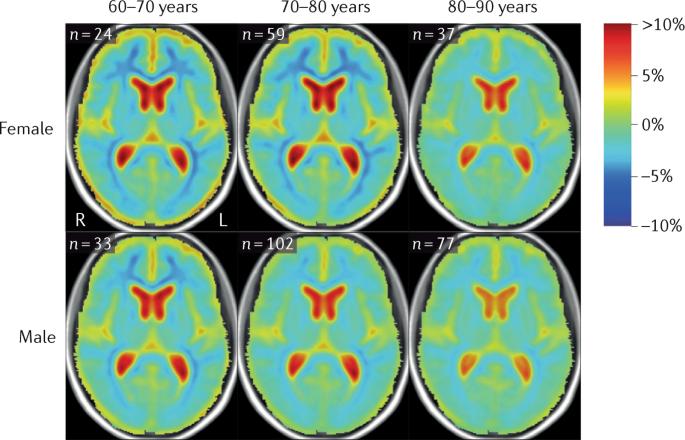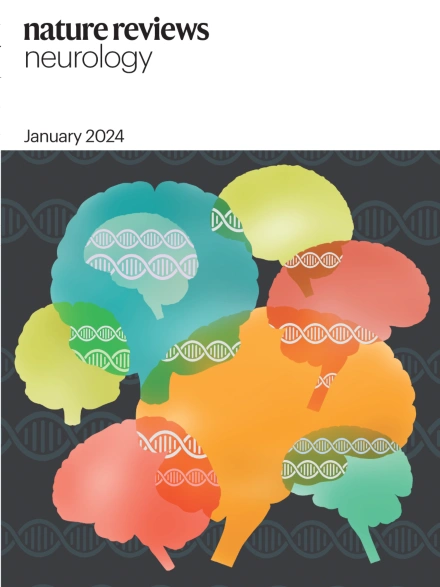Sex differences in Alzheimer disease — the gateway to precision medicine
IF 28.2
1区 医学
Q1 CLINICAL NEUROLOGY
引用次数: 478
Abstract
Alzheimer disease (AD) is characterized by wide heterogeneity in cognitive and behavioural syndromes, risk factors and pathophysiological mechanisms. Addressing this phenotypic variation will be crucial for the development of precise and effective therapeutics in AD. Sex-related differences in neural anatomy and function are starting to emerge, and sex might constitute an important factor for AD patient stratification and personalized treatment. Although the effects of sex on AD epidemiology are currently the subject of intense investigation, the notion of sex-specific clinicopathological AD phenotypes is largely unexplored. In this Review, we critically discuss the evidence for sex-related differences in AD symptomatology, progression, biomarkers, risk factor profiles and treatment. The cumulative evidence reviewed indicates sex-specific patterns of disease manifestation as well as sex differences in the rates of cognitive decline and brain atrophy, suggesting that sex is a crucial variable in disease heterogeneity. We discuss critical challenges and knowledge gaps in our current understanding. Elucidating sex differences in disease phenotypes will be instrumental in the development of a ‘precision medicine’ approach in AD, encompassing individual, multimodal, biomarker-driven and sex-sensitive strategies for prevention, detection, drug development and treatment. In this Review, Ferretti et al. discuss the evidence for sex-related differences in Alzheimer disease symptoms, progression, risk factors and treatment, and consider how understanding sex differences is crucial in developing precision medicine.

阿尔茨海默病的性别差异--通向精准医疗的大门
阿尔茨海默病(AD)在认知和行为综合征、风险因素和病理生理机制方面具有广泛的异质性。解决这种表型差异对于开发精确有效的阿尔茨海默病治疗方法至关重要。神经解剖和功能方面与性别有关的差异已开始显现,性别可能是对注意力缺失症患者进行分层和个性化治疗的一个重要因素。虽然性别对AD流行病学的影响是目前研究的热点,但AD临床病理表型的性别特异性这一概念在很大程度上还未得到探讨。在这篇综述中,我们将批判性地讨论在注意力缺失症症状、进展、生物标志物、风险因素和治疗方面与性别相关的差异证据。综述中累积的证据表明,疾病的表现形式具有性别特异性,认知能力下降和脑萎缩的速度也存在性别差异,这表明性别是疾病异质性的一个关键变量。我们将讨论当前认识中的关键挑战和知识差距。阐明疾病表型中的性别差异将有助于开发AD的 "精准医疗 "方法,包括个体、多模式、生物标记驱动和对性别敏感的预防、检测、药物开发和治疗策略。在这篇综述中,Ferretti 等人讨论了阿尔茨海默病症状、进展、风险因素和治疗中与性别有关的差异的证据,并探讨了了解性别差异对开发精准医学的重要性。
本文章由计算机程序翻译,如有差异,请以英文原文为准。
求助全文
约1分钟内获得全文
求助全文
来源期刊

Nature Reviews Neurology
医学-临床神经学
CiteScore
29.90
自引率
0.80%
发文量
138
审稿时长
6-12 weeks
期刊介绍:
Nature Reviews Neurology aims to be the premier source of reviews and commentaries for the scientific and clinical communities we serve. We want to provide an unparalleled service to authors, referees, and readers, and we work hard to maximize the usefulness and impact of each article. The journal publishes Research Highlights, Comments, News & Views, Reviews, Consensus Statements, and Perspectives relevant to researchers and clinicians working in the field of neurology. Our broad scope ensures that the work we publish reaches the widest possible audience. Our articles are authoritative, accessible, and enhanced with clearly understandable figures, tables, and other display items. This page gives more detail about the aims and scope of the journal.
 求助内容:
求助内容: 应助结果提醒方式:
应助结果提醒方式:


